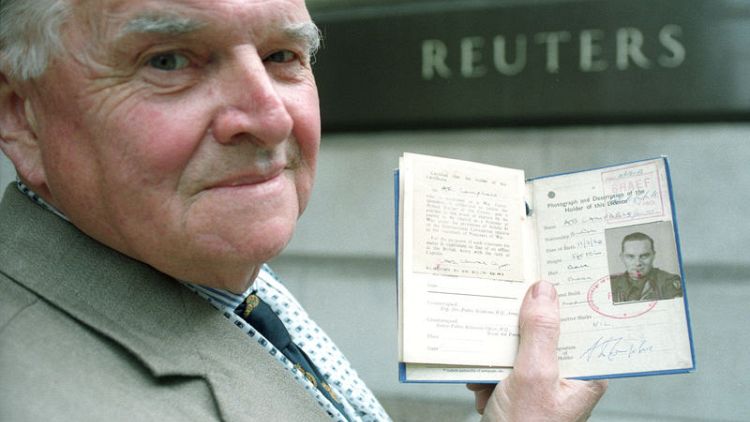PARIS (Reuters) - Seventy-five years ago, as machine gun fire consumed the landing beach in northern France and artillery shells burst overhead, Reuters correspondent Doon Campbell struggled to keep the keys of his typewriter free of the exploding earth.
But he needed to write his dispatch, so he tore a page from an exercise book, lay low and scribbled by hand, with the dateline: “A DITCH 200 YARDS INSIDE NORMANDY".
Campbell was the first war correspondent from an Allied nation to set foot on Normandy sand. He was also the youngest. Embedded in the Lord Lovat’s 1st Commando Brigade, the 24-year-old wire reporter, who was born with only half a left arm, staggered across the “sandy cemetery” that was Sword Beach.
(Graphic on Normandy Landings: https://tmsnrt.rs/2KhlJlQ)
"A few minutes ago I came ashore with the commandos who are thrusting inland, impatient and eager to get to grips with the enemy," the dispatch began. "On a vast scale the invasion is underway – everywhere thousands of men and hundreds of aircraft and ships.
"Every minute more men and guns, tanks, vehicles and huge amounts of supplies are landing ... Our planes dominate the skies. For the moment I’m staying in this ditch with the wounded."
The events that day were "exhilarating, glorious and heartbreaking," Campbell would recall five decades later.
Having written the first report on the largest amphibious invasion in history, Campbell crawled back to the shore, gave the dispatch to a naval officer and tipped him five pounds.
Five decades later, Campbell wrote that no one at Reuters recalled receiving the dispatch - the only version of it in the company's extensive archives is from his accounts. It was not clear, he said, if it ever reached the office.
But many more did, as the operation which paved the way for France to be freed from the clutches of Nazi Germany unfurled.
"It is a miracle that I’m alive to write this dispatch - that I’ve survived 24 hours on this beachhead bag of wicked tricks,” he wrote a day after the landings.
As the Allied invasion unfolded, Campbell witnessed bloody battles to liberate villages, endured the strafing of Luftwaffe war planes and sought shelter wherever he could.
"I’ve had several billets from dank trenches to chateau boudoirs and cellars, from the base of an apple tree to a hole in a wall," he wrote four days after the first landings.
"When bombs stop falling, shells start screaming, and snipers take over from mortars."
Campbell began his scoop-rich 30-year career a year before the Normandy invasion. He died in 2003, aged 83.
(Writing by Rachel Joyner; editing by Richard Lough and Andrew Heavens)
